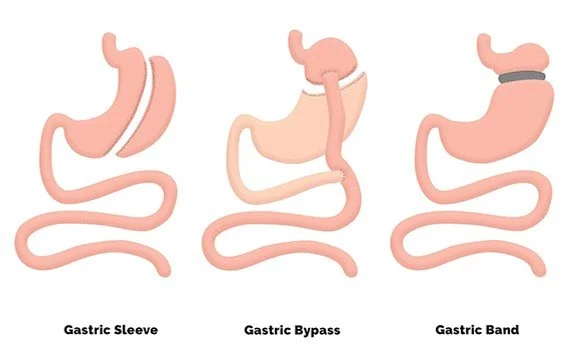Your Guide to Weight Loss Surgeries: Benefits, Risks, and More
Read Time: 2min 30 sec.
Starting a weight loss journey often involves exploring various avenues. Weight loss surgery is a substantial and potentially life-altering option among these. In this post, we'll delve into three prevalent types of weight loss surgeries: Sleeve Gastrectomy, Adjustable Gastric Banding, and Gastric Bypass aiming to provide a clear, understandable insight into what each entails and who they might be suitable for.
Understanding Obesity
Before we dive into weight loss surgeries, it's essential to understand obesity. It is a chronic condition characterized by an excessive amount of body fat. It's not just about appearances or societal standards; obesity is a severe medical issue associated with numerous health risks, including heart disease, diabetes, and certain cancers.
How Is Obesity Measured?
One standard measure of obesity is the Body Mass Index (BMI). A BMI of 30 or above is considered obese. At the same time, a BMI of 35 or higher with related health issues or a BMI of 40 or above, even without other weight-related conditions, may make you eligible for weight loss surgery.
Gastric Bypass (Roux-en-Y):
Definition: This surgery involves creating a small pouch at the top of the stomach and connecting it directly to the small intestine, bypassing a significant part of the stomach and the first section of the small intestine.
Indications: Recommended for individuals with a BMI of 40 or above or a BMI of 35 or above with related health conditions like type 2 diabetes or high blood pressure.
Benefits:
Significant weight loss: Most lose 60-80% of excess weight within 12-18 months.
Improved or resolved obesity-related conditions.
Appetite reduction due to changes in gut hormones.
Risks & Side Effects:
Nutritional deficiencies.
Surgical complications like leaks or infections.
"Dumping syndrome" causes nausea and vomiting if sugary or high-fat foods are consumed.
Impact on Weight and Health:
Weight Loss: Up to 80% of excess weight.
Improved Conditions: Type 2 diabetes, hypertension, sleep apnea, etc.
Sleeve Gastrectomy:
Definition: This surgery involves removing about 80% of the stomach, which leaves a narrow tube or "sleeve" that holds much less food. Plus, it reduces the production of the hunger hormone ghrelin, which may decrease your desire to eat.
Indications: Suitable for individuals with a BMI of 40 or higher or a BMI of 35 or higher with related health issues.
Benefits:
Steady weight loss: Most lose 50-70% of excess weight within 12-18 months.
Reduced stomach size helps control hunger.
Improvement in obesity-related conditions.
Risks & Side Effects:
Surgical complications like leaks or infections.
Potential for heartburn or gastroesophageal reflux disease (GERD).
Impact on Weight and Health:
Weight Loss: Up to 70% of excess weight.
Improved Conditions: Type 2 diabetes, sleep apnea, hypertension, etc.
Adjustable Gastric Banding:
Definition: Involves placing an inflatable band around the top portion of the stomach, which makes a small pouch above the band with a narrow opening to the rest of the stomach.
Indications: Recommended for those with a BMI of 30 or above with at least one obesity-related condition.
Benefits:
Gradual weight loss: Most lose 40-60% of excess weight within 12-24 months.
Adjustable: The band can be adjusted to manage hunger.
Lower surgical risk as it's reversible and less invasive.
Risks & Side Effects:
Band slippage or erosion.
Slower weight loss compared to other surgeries.
Possible need for re-operation.
Impact on Weight and Health:
Weight Loss: Up to 60% of excess weight.
Improved Conditions: Some improvement in obesity-related conditions, though not as pronounced as other surgeries.
Conclusion:
Weight loss surgery is a significant step towards a healthier life, and understanding the different types available, along with their benefits, risks, and indications, is crucial for making an informed decision. Each surgical type caters to different individual needs and health conditions. A thorough consultation with healthcare professionals will provide personalized advice.


